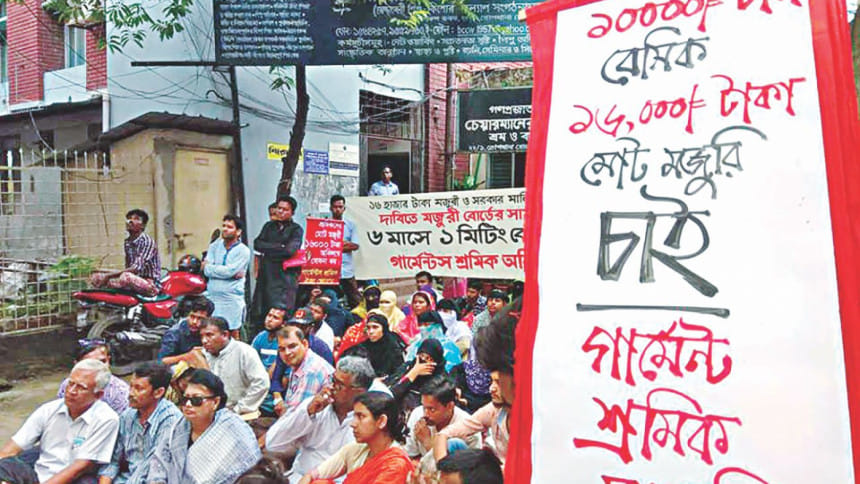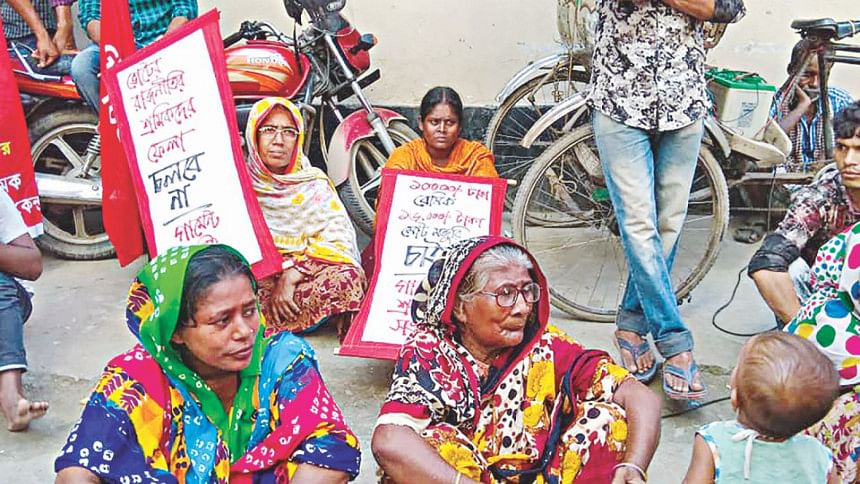THE SECOND TIME AS FARCE

[W]hat security has the working man that it may not be his turn [to starve] tomorrow? Who assures him employment, who vouches for it that, if for any reason or no reason his lord and master discharges him tomorrow, he can struggle along with those dependent upon him, until he may find someone else 'to give him bread'? Who guarantees that willingness to work shall suffice to obtain work, that uprightness, industry, thrift, and the rest of the virtues recommended by the bourgeoisie, are really his road to happiness? No one. He knows that he has something today, and that it does not depend upon himself whether he shall have something tomorrow.1
What is it that tells us that the above is not a description of the lives of the four million and more workers employed by the ready-made garment (RMG) industry of Bangladesh? For one thing, the average Bangladeshi garment worker is far more likely to be a she, and her life is perhaps slightly less precarious than what the young Friedrich Engels found in his tour of working class England in the 1840s, in the heart of the textile boom that would soon change the face of the Earth forever. Yet, here we are, fighting the same fight. History does, it seems, repeat itself, as Karl Marx put it, "the first time as tragedy, the second time as farce."
The (literal) farce this time around is the 'tripartite' wage board set up earlier this year to discuss and come to an agreement on a higher minimum wage for the country's RMG industry. The minimum wage, as it stands today, amounts to Tk 5,300 (approx. $63), a mere 14 percent of the Tk 37,661, a bare minimum living wage calculated by the Asia Floor Wage Alliance.2 Even this paltry sum—and no one familiar with food prices, living costs, medical and educational expenses and the like in the vicinity of the capital can doubt that this is an unlivable sum—was won through the last wage review in 2013, in the wake of the mass structural murder that was Rana Plaza.
This wage board comes in the aftermath of the agitation and dissent that swept Ashulia and Savar just over a year ago, when the demands were raised for better health and safety conditions, a more democratic workplace, Labour Law reform, an end to the illegal sackings, beatings, arrests and random factory closings used to intimidate and discipline dissenting workers, and an increase in the minimum wage to Tk 16,000 (through a new wage review board). Now that the five years legally allotted before a new wage board must be called is up, the garments oligarchy and their lackeys in Parliament can no longer allies dismiss the demand for wage structure reform; this is true especially in the aftermath of the public relations nightmare resulting from prominent brands (such as H&M and Zara) boycotting the 2017 Dhaka Apparel Summit (directly in response to the treatment of workers and activists).
One cannot help but admire the (dis)ingenuity with which the BGMEA have claimed credit for 'urging' the state to set up a new wage board, while at the same time continuing to place the blame on 'worker agitation,' painting a picture of an uncontrolled mass of irrational children throwing a collective tantrum, unable to comprehend 'reality' and the so-called 'logic of the market' (one and the same thing in the minds of many), as opposed to a collectivity of human beings demanding fair pay for their labour and struggling to live lives with a semblance of human dignity.
Nevertheless, whatever the official discourse, we have a new wage board. On this board sits the permanent members Syed Aminul Islam (Senior District Judge), Kazi Shafiuddin Ahmed (Labour Advisor to the Bangladesh Employer's Federation), Fazlul Haque Montoo (Executive President of the Jatiya Sramik League) and Kamal Uddin (Professor at Dhaka University); joining them as owners' and workers' representatives (respectively) are Siddiqur Rahman (President of the BGMEA) and Shamsunnahar Bhuyian (Women's Affairs Secretary of the Jatiya Sramik League). Workers and labour activists have every reason to be wary of the composition of this board, with no representation of non-Awami League aligned labour organisations to speak of. Shamsunnahar Bhuyian did not even have the conviction to propose the amount that workers and labour leaders across the board have been demanding, proposing instead a new minimum wage of Tk 12,020 (still a mere 32 percent of the Asia Floor Wage). Alas, to the discontent of many but to the surprise of none, the BGMEA has proposed Tk 6,360. No one, of course, expected the BGMEA to match the workers' and labour organisations' demands; what their pitifully comical proposal signals, however, is a complete unwillingness to take the matter seriously and a chronic inability to learn from past mistakes.

To keep flogging a dead horse—wage stagnancy in the Bangladeshi RMG industry does not reflect wider economic trends, but is artificially induced by a state-industry nexus that knows full well that it has yet to have anything more to offer than the world's cheapest labour. The 'miracle' behind the main engine driving Bangladesh's economic growth since the 1980s amounts to little more than an astonishing degree of comfort with the reduction of human lives to disposable spinning machines. RMG wages here remain the lowest and most stagnant in the world—not only is our minimum wage lower than in Vietnam, Thailand, the Philippines, Pakistan, Malaysia, Indonesia, India, China and Cambodia (as of 2016), it has proved remarkably stagnant in comparison to every single one of these countries (except for the Philippines, but where the minimum wage is one of the highest).
The Bangladeshi state has long made it clear that it has no qualms with letting millions of its citizens struggle in misery, violently putting down workers who think otherwise, and slandering those of us who even think of speaking up (we have been accused of being 'in bed with' everyone from foreign states and MNCs to local Islamist parties). The so-called 'national interest' it serves clearly does not include the interests of those whose labour constitutes the bulk of our national wealth, be it our garment workers or the millions we so happily abandon to modern-day slavery in the Middle East and Southeast Asia. With the threat of 'graduating' from the category of 'Least Developed Country' (LDC) and losing our duty-free export privileges in the EU, this government is more frantic than ever to maintain the disposability of our people. But the Emperor has no clothes, and this nexus knows very well that they are fighting a losing battle. No one but the ruling elite and their devotees think that the achievement of the mythical 'Middle Income Country' status, coming at the expense of the lives of millions of Bangladeshi citizens, would amount to any achievement at all. Continuing on this path will lead to nothing but ruin; resting on the laurels of improved health and safety conditions, we cannot delude ourselves into thinking that we have found an adequate solution to a purely technical problem. This remains what it has always been—a question of power, and it will be won or lost in the streets if those behind closed doors pay no heed.
1. Friedrich Engels, The Condition of the Working Class in England (Oxford: Oxford University Press, 2009), 38-39. First published as Die Lage der arbeitenden Klasse in England in 1845 (Leipzig). Written September 1844 to March 1845.The Condition of the Working Class, Engels' first book, is what inspired a young Karl Marx to focus his attention from the critique of Hegelian philosophy to the study of political economy, and was thus responsible for sparking the most influential intellectual collaboration in the history of social thought.
2. An international consortium of trade unions, labour organisations and activists working towards the establishment of a living wage for the millions of garment workers across Asia; presently this wage floor, calculated in Purchasing Power Parity (PPP) terms, stands at USD 1,181.
Shehzad M Arifeen teaches at the Department of Economics and Social Sciences, BRAC University

 For all latest news, follow The Daily Star's Google News channel.
For all latest news, follow The Daily Star's Google News channel. 



Comments